Ertuğrul Kürkçü
Engaging in verbal altercations with retirees at the most inopportune time, Erdoğan suddenly found himself on the fringes of the popular political scene, transforming into a communication wreckage*. In AKP propaganda groups, warnings began circulating: “Let’s not talk too much about our President Recep Tayyip Erdoğan. Especially since retirees are reacting negatively.” This is not without reason. If the “People’s Alliance” loses the metropolises for the second time on 31 March, Erdoğan’s treatment of a community of 15 million voters as if they were disposable will also have played a role.
Erdoğan and Fidan’s Psychological Warfare
However, retirees are just one element targeted by the dictatorship’s “psychological warfare” spectrum. The spectrum is broad: Sect followers, ultra-nationalists, urban poor, anti-immigrants, immigrants, “Black Sea regionals”, Kurds…
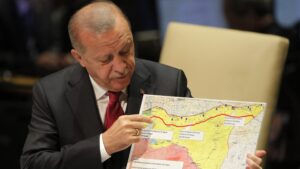
After the general elections, in August 2023, I wrote in this column: “There is no doubt that, within the framework of the ‘unity of domestic and foreign policy’—a doctrine built on Kurds by President Erdoğan and Foreign Minister Hakan Fidan—the Kurdish freedom struggle will become a target of the dictatorship’s psychological warfare, especially before the 2024 local elections, that is, in the next six to seven months, given their significant political mobility achieved in Turkey’s domestic politics through the Peoples’ Democratic Party (HDP).”
Turkish Military and Diplomatic Efforts in the Region
This assertion was not a prophecy, but it was not made out of thin air either. The following lines were the result of the need to understand the shuttling of Hakan Fidan, newly appointed as Foreign Minister in Erdoğan’s cabinet from the head of the National Intelligence Organisation (MIT), between Iraqi and Kurdistan Region leaders throughout August.
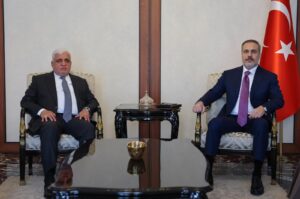
“When we consider Fidan’s Iraqi engagements and initiatives in conjunction with his efforts to get Erdoğan and Assad to the negotiating table in Syria, it becomes apparent that the regime is occupied with this strategic objective: Ankara aims to escape the resistance rising from Northern Kurdistan, isolate the vanguard force of the North, and propose a renewed anti-Kurd pact to the Iraqi and Syrian states, balanced with economic and political interests, to prevent Kurdish national capabilities in Western and Southern Kurdistan from being directed towards the North.”
Century of Turkish vs Kurdish Achievements
I had also summarised the tendency of this foreign policy to reflect inwardly: “Every step of the international strategy pursued by Fidan will inevitably aim at disrupting the political march that brings the Kurdish people together with the democratic and freedom-seeking dynamics of other peoples, isolating and marginalising the democratic liberation option represented by the HDP.”
“The short-term regional projection of the regime’s ‘Century of Turkey’ vision towards the Kurds boils down to this.”
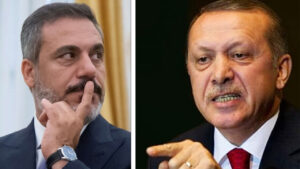
Throughout the year, the regime systematically followed the political, diplomatic and military logic of its sovereignty strategy and continued to strengthen it. It minimised conflict with the USA, cleared the hurdles for acquiring fighter jets for the F-16 fleet. Contacts with Baghdad became daily and have started to reflect on the developments in the field.
Preparations of an Anti-Kurd pact
In February, following in Hakan Fidan’s footsteps, National Defence Minister Yaşar Güler met with the President, Prime Minister, Foreign Minister and Defence Minister in Baghdad, and then with Masoud Barzani and Masrour Barzani in Erbil. The key words in the statements given after these meetings indicated that there was a shift from desk-based planning to focusing on details on the ground.
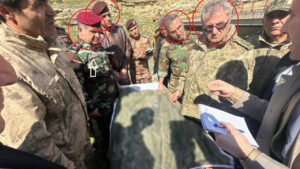
In early March, Iraqi Foreign Minister Fuad Hussein said in an interview with AA at the “Antalya Diplomacy Forum” that a “nice meeting” on security had been held in Ankara. He mentioned that “the Iraqi side has already prepared the document regarding security, border security and the security of relations between the two countries” and expressed hope to discuss these documents next month in Baghdad and develop a plan based on them.
Turkey’s New Tactic: Declaring Kurdish Lands ‘Terroristan’
And the inevitable conclusion: In a Cabinet Meeting, Erdoğan announced, “We are about to complete the circle that will secure our borders with Iraq. God willing, we will have resolved the issue related to our borders with Iraq permanently this summer. Our resolve to create a security corridor 30-40 kilometres deep along our border with Syria continues. We have preparations that will give new nightmares to those who think they can subdue Turkey with a ‘terroristan’ along our southern borders.”
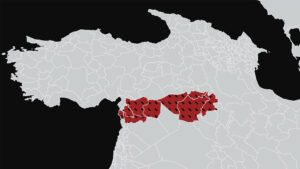
What Erdoğan refers to as the “circle that will secure our borders with Iraq” can be anticipated to mean an expansion and deepening of Turkey’s military presence in Southern Kurdistan territories, to the point where units capable of forming a “circle” due to their proximity and combat capabilities. The military strategy known as “ink spot” in military literature, its translation into Kurdistan’s social life would mean an area on both sides of the Turkey-Iraq border, approximately 20-30 km deep – possibly deeper on the Iraqi side – becoming a de facto military exclusion zone. It’s foreseeable that Hakkari and Şırnak, gaining socio-political significance as power centres of Kurdistan patriotism, will become targets of military and psychological operations.
A Consensus on US Military Presence?
Considering the desire and insistence of the Iraqi and Syrian governments for the quickest withdrawal of US military presence in their countries, and keeping in mind that the likelihood of Donald Trump returning to the White House next year is as high as Joe Biden staying in office, it’s visible that the Turkish regime’s military and administrative influence along the border will significantly increase immediately after the local elections.
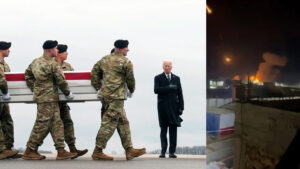
In this context, Ankara may find an excuse to revise its “security corridor” plans across all of Rojava, beyond the internal security rationale, against the possible “rebirth” of ISIS, playing the role of the sole guardian of NATO interests.
Actions in the South and East Reverberate Through Northern Kurdistan
Military operation plans extending beyond the borders of Iraq and Syria will not only feed the possibility of conflict between the combat forces across the border and the Turkish Armed Forces. As we know from previous experiences, it will also bring the possibility of a military mobility that will engulf the North, starting from the border cities, turning Kurdistan into an actual battlefield.
One should not be misled by Erdoğan’s exaggerated speeches: When saying, “We have preparations that will bring new nightmares to those who think they can bring Turkey to its knees by establishing a ‘terrorist state’ along its southern borders,” it would be more accurate to think that what motivates him is not an insatiable appetite for bluster, but rather the remnants in his mind from summaries of files built on these possibilities.
Election Politics and the ‘Unity of Foreign and Domestic Politics’ Doctrine
The “People’s Alliance” local election campaign is clearly lacklustre, weak, feeble and lacks credibility. However, despite all the objective adverse conditions in domestic politics, social and economic spheres, the Erdoğan regime has not deviated from its strategy of entering the long, hot summer ahead, starting with reclaiming the metropolises, especially Istanbul. Maintaining a puppet candidate on the verge of winning in Istanbul necessitates a consolidation of power that only political experts are privy to. The likelihood of Erdoğan’s candidate losing is visible, but it’s a possibility – not yet a reality.
Erdoğan lacks the “might” needed to overcome these objective conditions. He cannot transform something he does not have. He cannot invent a new ally for himself. However, in the opposition camp, the lack of understanding in defining their own interests, naivety, timidity, the arrogance of seeing oneself as an indispensable asset, the political ineptitude of proposing to share resources with those who have already drained every resource meant for the people to the last drop, and similar deficits in wisdom and foresight can be harnessed as a reserve force to run ahead of their own ranks. It could pave the way for “geniuses” among those weary of hope and struggle who theorise that the dictator’s likelihood of abandoning the institutionalisation of fascism is higher than a tiger choosing vegetarianism…
All these can be as bothersome as flies swarming over the sweaty bodies of those fighting in the summer heat. But what the Kurdish people and the democratic and societal opposition forces in Turkey need to face the long hot summer ahead is not Erdoğan’s benevolence, but to continue walking the path shown by reason and morality to win and protect what is theirs, without doubt!
(*) Turkish President Erdoğan has recently rejected proposals for a rise in pension payments, citing the country’s budget constraints as the primary reason. He argued that the suggested increase of 7,000 to 10,000 Turkish Lira (USD217–310) for each of the 16 million retirees would be financially unsustainable. According to him, even if the government diverted all its investment budget or funds allocated for disaster relief, education and healthcare, it still would not cover the additional cost. This stance has sparked a negative reaction among retirees, contributing to a decline in his popularity.
Ertuğrul Kürkçü is the current Honorary President of the Peoples’ Democratic Party (HDP) and Honorary Associate of the Parliamentary Assembly of the Council of Europe (PACE). He spent 14 years as a prisoner between 1972-1986 for his political activism in Turkey. He is also member of Progressive International Council.










